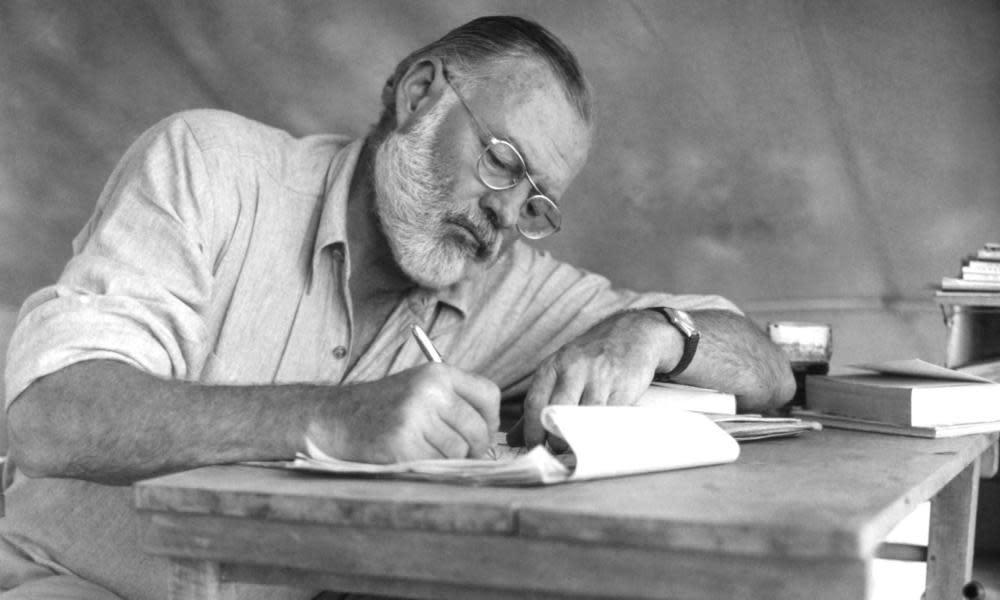'You've bollixed up my book': letter reveals Hemingway's fury at being censored

The hard-drinking, hot-tempered American writer Ernest Hemingway was furious when he discovered that the language for the English edition of his latest book had been cleaned up, a previously unpublished letter reveals. “I will make my own bloody decisions as to what I write and what I do not write,” he raged to his British publisher, adding that he did not want the book to be “bollixed up”.
The fury within the lines of the letter would have left Jonathan Cape in no doubt of Hemingway’s feelings about editorial changes to his 1932 nonfiction book about bull-fighting, Death in the Afternoon. That those changes were made without his knowledge or permission left him all the more outraged.
Hemingway sent the letter to Cape on 19 November 1932: “All pleasure I had about the book coming out in England was effectively and completely removed by your letter of November 3rd. Don’t you understand that if any excisions or changes have to be made it is I who will make them if the book is not to be bollixed up? I thought we had gone into that once.
“If you want to publish any more books of mine, and it is quite all right if you do not, it is necessary to understand this very clearly. You are not my vicar. If the Pope is the vicar of Christ it is because Our Lord is not here upon earth to make his own decisions. I am not Christ (oddly enough) and as long as I am here upon earth will make my own bloody decisions as to what I write and what I do not write…
“If you say a book will be suppressed if it contains certain words and you do not care to publish it for that reason that is your affair. If I find the words are not important and can conceivably change them without loss of sense, meaning or effect I will change them or leave a blank. I will be damned if I have any vicar pruning my books to please the circulating libraries.”
Hemingway’s missive is among previously unpublished letters that will appear in The Letters of Ernest Hemingway, Volume 5 (1932-1934), the latest of a projected 17 volumes, to be published by Cambridge University Press later this spring.
Professor Sandra Spanier, general editor of the Hemingway Letters Project and co-editor of each volume, told the Observer: “It’s a wonderful letter… Hemingway was responding to Cape’s letter of 3 November. Cape had written that he had made a few omissions of ‘Anglo-Saxon words’ that would be unacceptable to the English public. Where the American edition of Death in the Afternoon reads ‘go f—k yourselves’, Cape’s English edition reads, ‘go hang yourselves’. Elsewhere Cape replaced ‘f—k’ with ‘blast’.”
Hemingway’s typed response, which has been unearthed from the Jonathan Cape archives at Reading University, also included: “In your letter on excisions you mention the word bugger as being on page 81 and that in your capacity as vicar you have changed this word to read hang.”
Death in the Afternoon contains some of Hemingway’s finest writing and reflects his belief that bullfighting was “of great tragic interest, being literally of life and death”.. Cape’s edition came out in November 1932, following the American edition’s September publication.
Hemingway had by then found international fame with A Farewell to Arms, his 1929 novel. After later masterpieces such as For Whom the Bell Tolls, he went on to win the Nobel Prize for Literature in 1954 “for his mastery of the art of narrative, most recently demonstrated in The Old Man and the Sea, and for the influence that he has exerted on contemporary style”.
Among other previously unpublished letters in the forthcoming Volume 5 is one dated 7 October 1932 to Archibald MacLeish, a poet and friend. With his idiosyncratic grammar, Hemingway wrote: “Glad you liked the last chapter [of Death in the Afternoon]… N.Y. Times critic said it was gibberish or nonsense or something of the sort – It makes you feel good to know that the sons of bitches dont still know what it all means - as long as they dont you are still going ahead.”
Spanier said: “He’s joking about how it’s good to stay ahead of the critics. It means that you’re doing well if they can’t understand it.”
In that letter, Hemingway continued: “I’d like to sometime write something so goddamned good that I’d know I could never write anything better.”


